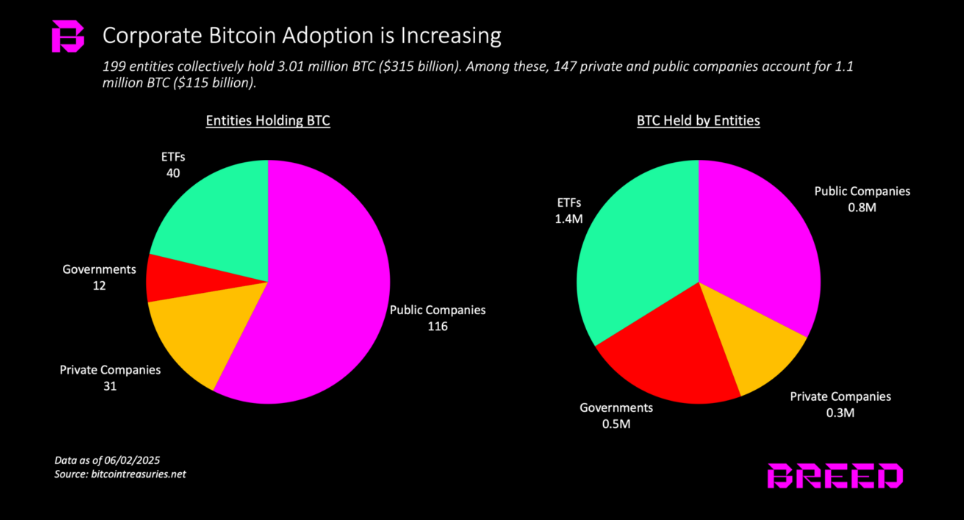Corporate Bitcoin Treasuries Smash 3M BTC Barrier as Institutional Adoption Explodes
Wall Street's digital gold rush hits hyperdrive.
Forget your grandpa's treasury bonds—2025's corporate balance sheets are bleeding orange. Bitcoin holdings at publicly traded companies just crossed the 3 million BTC threshold, according to new market intelligence. That's enough to make Satoshi's ghost high-five Vitalik in the crypto afterlife.
Institutional FOMO reaches critical mass
MicroStrategy's playbook has gone viral. Once-skeptical CFOs now scramble to convert cash reserves into decentralized hard assets—because nothing says 'hedge against inflation' like an asset that can swing 20% before lunch.
The irony? These same firms that spent years dismissing crypto now can't onboard fast enough. Guess those 'risk management' departments finally read the whitepaper.
As traditional treasuries diversify into digital assets, one question remains: When do we start seeing Bitcoin collateralized loan obligations? (Wall Street's alchemists are already working on it—some things never change.)
Corporate Bitcoin Holdings Surge
Among those 199 entities, 147 public and private companies account for 1.1 million BTC (around $115 billion). Strategy, the pioneer in this space, holds 580,250 BTC—about $60 billion—and trades at a market cap of $104 billion.
That gives it a Multiple on Net Asset Value (MNAV) of 1.7× today. Investors once paid up to 2× NAV for Strategy’s shares, reflecting confidence in its ability to grow BTC‑per‑share faster than anyone else.

Valuing Pure Play Treasury Firms
When a firm’s main business is holding Bitcoin, its shares need to outperform Bitcoin itself. That premium, known as MNAV, depends on faith in management and clear execution plans.
Strategy has used three main tools since 2020: issuing convertible debt, running an At‑the‑Market stock program, and plowing free cash FLOW into spot Bitcoin.
New rivals are copying and tweaking this playbook—letting holders swap coins for stock, buying underpriced firms to turn cash into BTC, and even adding private deals to raise funds.

An extended bear market could test these models. If bitcoin falls and shares trade at or below NAV, debt‑heavy firms might struggle to refinance when notes come due.
That could force them to sell Bitcoin into a downtrend, pushing prices lower. Smaller companies without Strategy’s scale will face higher borrowing costs and tougher terms.
During a recession, margin calls and forced sales may cascade throughout the market, although most of these companies use equity financing mainly.
From September 2021, as soon as El Salvador legitimized BTC as legal tender, corporate demand grew. BlackRock’s launch of IBIT ETF in January 2024 further fueled it, and US President Donald TRUMP has talked about the economic function of Bitcoin.
Now, new players from Japan’s Metaplanet to US‑based GameStop are rolling out treasury plans. Purpose‑built firms like Twenty One Capital and reverse‑merger entrants such as Strive and Nakamoto have staked their futures on Bitcoin.
More Companies To Enter The Market?Experts expect more crypto treasury companies to emerge—covering assets like Solana and ethereum as well. Early names include DeFi Development Corp with 420,000 SOL and SharpLink Gaming, which raised $425 million for ETH holdings.
Many will fail, and the strongest will buy up weaker rivals. Thankfully, most rely on stock‑based financing, so a few collapses won’t topple the whole market. But those loaded with debt could still pose a wider threat.
Featured image from Mobee, chart from TradingView

